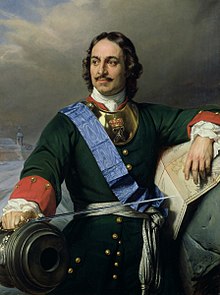 Global Information
Global InformationForeign policy of the Russian Empire information

The foreign policy of the Russian Empire covers Russian foreign relations from their origins in the policies of the Tsardom of Russia (until 1721) down to the end of the Russian Empire in 1917. Under the system tsarist autocracy, the Emperors/Empresses (at least theoretically) made all the main decisions in the Russian Empire, so a uniformity of policy and a forcefulness resulted during the long regimes of powerful leaders such as Peter the Great (r. 1682–1725) and Catherine the Great (r. 1762–1796). However, several weak tsars also reigned—such as children with a regent in control—and numerous plots and assassinations occurred. With weak rulers or rapid turnovers on the throne, unpredictability and even chaos could result.[1]
Russia played a relatively minor role in the Napoleonic Wars until 1812, when the Imperial Russian Army virtually destroyed Napoleon's huge army when it invaded Russia. Russia played a major role in the eventual defeat of Napoleon and in setting conservative terms for the restoration of aristocratic Europe during the period of 1815 to 1848 as the Holy Alliance. Russia conducted several wars with the Ottoman Empire between 1568 and 1918, and in 1856 Russia lost the Crimean War to a coalition of Britain, France and the Ottoman Empire. More small wars followed in the late-19th century, as well as the large-scale Balkan War of 1877-1878.
For three centuries, from the days of Ivan the Terrible (ruled 1547 to 1584), Russia expanded in all directions at a rate of 18,000 square miles per year, becoming by far the largest power in terms of contiguous land area. The expansion brought under Russian governance many minority ethnic groups who had their own religions and languages. The Imperial Russian political system was an autocracy ruled by the tsar; in its later days it was challenged by various revolutionary groups who were rendered largely ineffective by a tough police state that sent many thousands of its opponents into exile in remote Russian Siberia. Territorial expansion had slowed by the 1850s, but there was a southward conquest in Central Asia toward Afghanistan and India greatly troubling Britain, which controlled India, leading to the Great Game. Russia also acquired territories in Manchuria from the Qing Dynasty. Russia's main historic enemy was the Ottoman Empire, which controlled Russia's access to the Mediterranean Sea. Later tsars sponsored Slavic insurgents in the Balkans against the Ottomans. Serbia supported insurgents against Austria, and Russia stood behind Serbia, which (like Russia) was Eastern Orthodox in religion and Slavic in culture. Russia's main ally from the 1890s was France, which desired Russian size and power to counter the increasingly powerful German Empire (founded in 1871); followed by Britain in the Anglo-Russian Convention (1907). Russia expanded influence in East Asia during this time as did other Western powers and Japan, joining to suppress the Boxer Rebellion, acquiring concessions in China and invading Manchuria. In 1904-1905 the massive Russo-Japanese War was fought in Chinese territory.
Russia entered World War I in 1914 against Germany, Austria and the Ottoman Empire to defend the Kingdom of Serbia, and to gain access to the Mediterranean Sea at the expense of the Ottoman Empire. Financial help came from its allies Britain and France. The Russian military faltered, as did the political and economic system. Russians lost faith in the failed Emperor Nicholas II. There resulted two revolutions in 1917 which destroyed the Russian Empire and led to independence for the Baltic states, Finland, Poland and (briefly) Ukraine and a host of smaller nation-states such as Georgia. After sharp fighting in the Russian Civil War of 1917–1922 with international involvement, a new regime of Communism under Lenin secured control and established the Soviet Union (USSR) in 1922. For the following period of Russian foreign relations see Foreign relations of the Soviet Union.
- ^ Hugh Ragsdale, Imperial Russian Foreign Policy (1993)